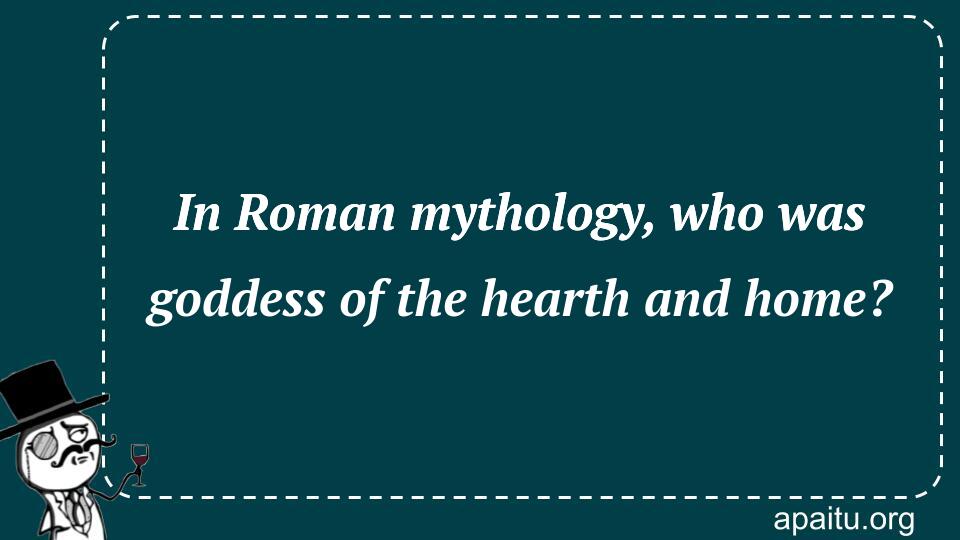Question
Here is the question : IN ROMAN MYTHOLOGY, WHO WAS GODDESS OF THE HEARTH AND HOME?
Option
Here is the option for the question :
- Minerva
- Vesta
- Flora
- Diana
The Answer:
And, the answer for the the question is :
Explanation:
Vesta was associated with the hearth and the domestic domain. Because the fire was the focal point of the home, she was an essential figure in both private and public worship. In most depictions, she is accompanied by an ass, her chosen animal. Because of her connection to the hearth fire, she was also the patron goddess of bakers. Furthermore, the ass was used to power the millstone, which ground the flour for baking. The Vestal Virgins were a group of six women who dedicated their lives to serving Vesta and keeping the fire alive at her shrine.

Vesta: The Goddess of Hearth and Home in Roman Mythology
In the rich tapestry of Roman mythology, Vesta stands as a revered and essential deity, embodying the concept of the hearth and home. As the goddess of the hearth, Vesta held a fundamental role in Roman society, representing warmth, nourishment, and the sacred space where families gathered. This article explores the significance of Vesta in Roman mythology and the crucial role she played in the lives of ancient Romans.
Vesta, known as Hestia in Greek mythology, was one of the twelve major gods and goddesses in the Roman pantheon. She was the daughter of Saturn and Ops, and sister to Jupiter, Neptune, Pluto, Juno, and Ceres. Vesta’s primary domain was the hearth, the central fireplace found in ancient Roman homes. In essence, she personified the sacred fire that burned continuously in the hearth, symbolizing the warmth and vitality of the household.
The sacred fire tended by Vesta was more than a mere source of physical warmth; it represented the spiritual heart of the home. It was believed that as long as the sacred fire burned, the family would be blessed with protection, harmony, and prosperity. The hearth, where the fire resided, was the focal point of domestic life, serving as a gathering place for family members to share meals, offer prayers, and seek solace.
Vesta was revered as a chaste goddess, representing purity and virtue. Her role as the guardian of the hearth extended beyond the physical domain of the home. She was also seen as the protector of the city of Rome, with her sacred fire symbolizing the eternal flame that illuminated and safeguarded the entire community.
The religious cult of Vesta held great importance in ancient Rome. Her temple, the Temple of Vesta, was located in the Roman Forum and housed the sacred fire tended by the Vestal Virgins. These priestesses, known as the Vestals, were chosen at a young age and dedicated their lives to the service of Vesta. They were responsible for maintaining the eternal flame, ensuring its continuity and purity. Any breach of their vow of chastity was considered a dire offense and believed to bring misfortune upon the city. The Vestals held a revered status within Roman society and were granted various privileges and honors.
The worship of Vesta extended beyond the confines of Rome itself. Throughout the Roman Empire, households maintained their own household shrines dedicated to Vesta, where a smaller sacred fire was kept burning. This practice symbolized the connection between the sacred hearth and the divine presence of Vesta, ensuring the well-being and prosperity of the family.
Vesta’s influence extended beyond the domestic sphere. Her association with the hearth and home represented stability, harmony, and communal well-being. Her presence was invoked during public ceremonies and rituals, emphasizing the importance of a harmonious society where individuals were united by shared values and a sense of belonging.
Vesta, the goddess of the hearth and home in Roman mythology, played a vital role in ancient Roman society. As the guardian of the sacred fire and the embodiment of domestic warmth, she symbolized the unity, prosperity, and spiritual well-being of the household and the city. The worship of Vesta, upheld by the Vestal Virgins, underscored the significance of purity, virtue, and communal harmony. Vesta’s enduring presence in Roman mythology reminds us of the importance of the hearth as a symbol of comfort, nourishment, and the unifying power of family and community.